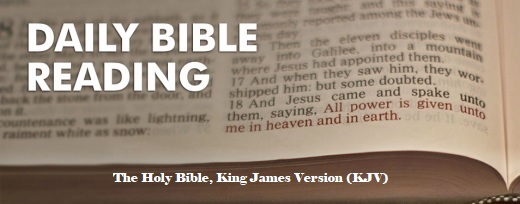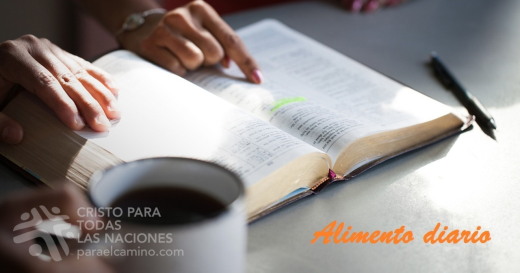The Daily Readings
MONDAY, October 5, 2020
Psalm 119:49-56; Deuteronomy 5:1-21; 1 Peter 2:4-10
The Holy Bible, King James Version (KJV)
Today’s Verse-of-the-Day:
Seek ye the Lord while he may be found, call ye upon him while he is near:Here is a gracious offer of pardon, and peace, and of all happiness. It shall not be in vain to seek God, now his word is calling to us, and his Spirit is striving with us. But there is a day coming when he will not be found. There may come such a time in this life; it is certain that at death and judgment the door will be shut.
Today’s Readings:
God’s commandments are my songs
49 Remember the word unto thy servant, upon which thou hast caused me to hope.Those that make God's promises their portion, may with humble boldness make them their plea. He that by his Spirit works faith in us, will work for us. The word of God speaks comfort in affliction. If through grace, it makes us holy, there is enough in it to make us easy, in all conditions. Let us be certain we have the Divine law for what we believe and then let not scoffers prevail upon us to decline from it. God's judgments of old comfort and encourage us, for he is still the same. Sin is horrible in the eyes of all that are sanctified. Ere long the believer will be absent from the body, and present with the Lord. In the meantime, the statutes of the Lord supply subjects for grateful praise. In the season of affliction, and in the silent hours of the night, he remembers the name of the Lord and is stirred up to keep the law. All who have made religion the first thing will own that they have been unspeakable gainers by it.
50 This is my comfort in my affliction: for thy word hath quickened me.
51 The proud have had me greatly in derision: yet have I not declined from thy law.
52 I remembered thy judgments of old, O Lord; and have comforted myself.
53 Horror hath taken hold upon me because of the wicked that forsake thy law.
54 Thy statutes have been my songs in the house of my pilgrimage.
55 I have remembered thy name, O Lord, in the night, and have kept thy law.
56 This I had, because I kept thy precepts.
The commandments at Sinai
5:1 And Moses called all Israel, and said unto them, Hear, O Israel, the statutes and judgments which I speak in your ears this day, that ye may learn them, and keep, and do them.Moses demands attention. When we hear the word of God we must learn it; and what we have learned we must put in practice, for that is the end of hearing and learning; not to fill our heads with notions, or our mouths with talk, but to direct our affections and conduct. There is some variation here from Exodus 20 as between the Lord's prayer in Matthew 6 and Luke 11. It is more necessary that we tie ourselves to the things than to the words unalterably. The original reason for hallowing the sabbath, taken from God's resting from the work of creation on the seventh day, is not here mentioned. Though this ever remains in force, it is not the only reason. Here it is taken from Israel's deliverance out of Egypt; for that was typical of our redemption by Jesus Christ, in remembrance of which the Christian sabbath was to be observed. In the resurrection of Christ we were brought into the glorious liberty of the children of God, with a mighty hand, and an outstretched arm. How sweet is it to a soul truly distressed under the terrors of a broken law, to hear the mild and soul-reviving language of the gospel!
2 The Lord our God made a covenant with us in Horeb.
3 The Lord made not this covenant with our fathers, but with us, even us, who are all of us here alive this day.
4 The Lord talked with you face to face in the mount out of the midst of the fire,
5 (I stood between the Lord and you at that time, to shew you the word of the Lord: for ye were afraid by reason of the fire, and went not up into the mount;) saying,
6 I am the Lord thy God, which brought thee out of the land of Egypt, from the house of bondage.
7 Thou shalt have none other gods before me.
8 Thou shalt not make thee any graven image, or any likeness of any thing that is in heaven above, or that is in the earth beneath, or that is in the waters beneath the earth:
9 Thou shalt not bow down thyself unto them, nor serve them: for I the Lord thy God am a jealous God, visiting the iniquity of the fathers upon the children unto the third and fourth generation of them that hate me,
10 And shewing mercy unto thousands of them that love me and keep my commandments.
11 Thou shalt not take the name of the Lord thy God in vain: for the Lord will not hold him guiltless that taketh his name in vain.
12 Keep the sabbath day to sanctify it, as the Lord thy God hath commanded thee.
13 Six days thou shalt labour, and do all thy work:
14 But the seventh day is the sabbath of the Lord thy God: in it thou shalt not do any work, thou, nor thy son, nor thy daughter, nor thy manservant, nor thy maidservant, nor thine ox, nor thine ass, nor any of thy cattle, nor thy stranger that is within thy gates; that thy manservant and thy maidservant may rest as well as thou.
15 And remember that thou wast a servant in the land of Egypt, and that the Lord thy God brought thee out thence through a mighty hand and by a stretched out arm: therefore the Lord thy God commanded thee to keep the sabbath day.
16 Honour thy father and thy mother, as the Lord thy God hath commanded thee; that thy days may be prolonged, and that it may go well with thee, in the land which the Lord thy God giveth thee.
17 Thou shalt not kill.
18 Neither shalt thou commit adultery.
19 Neither shalt thou steal.
20 Neither shalt thou bear false witness against thy neighbour.
21 Neither shalt thou desire thy neighbour's wife, neither shalt thou covet thy neighbour's house, his field, or his manservant, or his maidservant, his ox, or his ass, or any thing that is thy neighbour's.
Christ the cornerstone
2:4 To whom coming, as unto a living stone, disallowed indeed of men, but chosen of God, and precious,Christ is called a Stone, to teach his servants that he is their protection and security, the foundation on which they are built. He is precious in the excellence of his nature, the dignity of his office, and the glory of his services. All true believers are a holy priesthood; sacred to God, serviceable to others, endowed with heavenly gifts and graces. But the most spiritual sacrifices of the best in prayer and praise are not acceptable, except through Jesus Christ. Christ is the chief Corner-stone, that unites the whole number of believers into one everlasting temple, and bears the weight of the whole fabric. Elected, or chosen, for a foundation that is everlasting. Precious beyond compare, by all that can give worth. To be built on Christ means, to believe in him; but in this many deceive themselves, they consider not what it is, nor the necessity of it, to partake of the salvation he has wrought. Though the frame of the world was falling to pieces, that man who is built on this foundation may hear it without fear. He shall not be confounded. The believing soul makes haste to Christ, but it never finds cause to hasten from him. All true Christians are a chosen generation; they make one family, a people distinct from the world: of another spirit, principle, and practice; which they could never be, if they were not chosen in Christ to be such, and sanctified by his Spirit. Their first state is a state of gross darkness, but they are called out of darkness into a state of joy, pleasure, and prosperity; that they should show forth the praises of the Lord by their profession of his truth and their good conduct. How vast their obligations to Him who has made them his people, and has shown mercy to them! To be without this mercy is a woeful state, though a man has all worldly enjoyments. And there is nothing that so kindly works repentance, as of right thoughts of the mercy and love of God. Let us not dare to abuse and affront the free grace of God, if we mean to be saved by it; but let all who would be found among those who obtain mercy, walk as his people.
5 Ye also, as lively stones, are built up a spiritual house, an holy priesthood, to offer up spiritual sacrifices, acceptable to God by Jesus Christ.
6 Wherefore also it is contained in the scripture, Behold, I lay in Sion a chief corner stone, elect, precious: and he that believeth on him shall not be confounded.
7 Unto you therefore which believe he is precious: but unto them which be disobedient, the stone which the builders disallowed, the same is made the head of the corner,
8 And a stone of stumbling, and a rock of offence, even to them which stumble at the word, being disobedient: whereunto also they were appointed.
9 But ye are a chosen generation, a royal priesthood, an holy nation, a peculiar people; that ye should shew forth the praises of him who hath called you out of darkness into his marvellous light;
10 Which in time past were not a people, but are now the people of God: which had not obtained mercy, but now have obtained mercy.
The Bible texts of the Old Testament, Epistle, and Gospel lessons are from The Holy Bible, King James Version (KJV).
Commentaries from Matthew Henry's Concise Commentary on the Bible.
The Daily Bible Readings are selected from the Revised Common Lectionary Daily Readings, a three-year cyclical lectionary. We are currently in Year A. Beginning with the first Sunday of Advent in 2020, we will be in Year B. The year which ended at Advent 2019 was Year C. These readings complement the Sunday and festival readings: Thursday through Saturday readings help prepare the reader for the Sunday ahead; Monday through Wednesday readings help the reader reflect and digest what they heard in worship. Revised Common Lectionary Daily Readings, copyright © 2005 Consultation on Common Texts. www.commontexts.org
The Daily Readings for MONDAY, October 5, 2020
Psalm 119:49-56; Deuteronomy 5:1-21; 1 Peter 2:4-10 (KJV)










